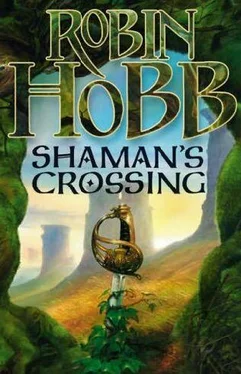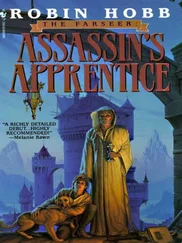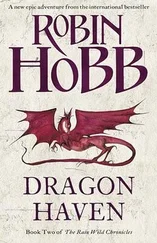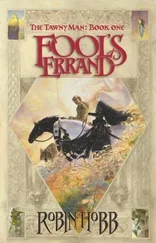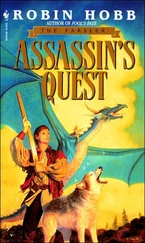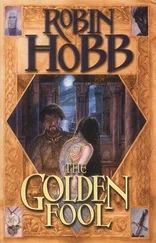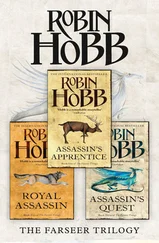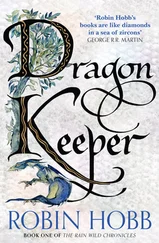I longed to return to my sisters’ company. I was also ashamed of missing them, for was I not a young man now and on my path to be my father’s soldier son? So he often reminded me, as did fat old Corporal Parth. Parth was what my mother somewhat irritably called a ‘charity hire’. Old, paunchy, and no longer fit for duty, he had come to ask my father’s aid and been hired as an unskilled groundskeeper. He was now the temporary replacement for the nanny I had shared with my sisters. He was supposed to school me in ‘the basics of military bearing and fitness’ each day until my father could find a more qualified instructor. I did not think much of Parth. Nanny Sisi had been more organized and demanded more discipline of me than he did. The slouching old man who had carried his corporal’s rank into retirement with him regarded me as more of a nuisance and a chore than a bright young mind to be shaped and a body to be built with rigor. Often, when he was supposed to be teaching me riding, he spent an hour napping while I practised ‘being a good little sentry and keeping watch’, which meant that I sat in the branches of a shady tree while he slept beneath it. I had not told my father any of that, of course. One thing that Parth had already instructed me in was that he was the commander and I was the soldier, and a good soldier never questioned his orders.
My father was well known at Franner’s Bend. We rode through the town and up to the gates of the fortress. There he was saluted and welcomed without question. I looked curiously about me as we rode past an idle smith’s shop, a warehouse, and a barracks before we reined in our horses before the commander’s headquarters. I gaped up at the grand stone building, three storeys tall, as my father gave Parth his instructions regarding me.
“Give Nevare a tour of the outpost and explain the layout. Show him the cannon and talk to him about their placement and range. The fortifications here are a classic arrangement of defences. See that he understands what that means.”
If my father had looked back as he ascended the steps, he would have seen how Parth rolled his eyes. My heart sank. It meant that Parth had little intention of complying with my father’s orders, and that I would later be held accountable for what I had not learned, which had happened before. I resolved, however, that it would not happen this time.
I followed him as we walked a short distance down the street. “That’s a barracks, where soldiers live,” he told me. “And that’s a canteen, tacked onto the end of it, where soldiers can get a beer and a bit of relaxation when they aren’t on duty.”
The tour of the fort stopped there. The barracks and canteen were constructed of wooden planks, painted green and white. It was a long, low building with an open porch that ran the length of it. Off-duty soldiers idled there, sewing, blacking their boots, or talking and smoking or chewing as they sat on hard benches in the paltry shade. Outside the canteen, another porch offered refuge for a class of men I knew well. Too old to serve or otherwise incapacitated, these men wore a rough mix of military uniform and civilian garb. A lone woman in a faded orange dress slouched at one table, a limp flower behind her ear. She looked very tired. Mustered-out soldiers often approached my father in the hope of work and a place to live. If he thought they had any use at all he usually hired them, much to my lady mother’s dismay. But these men, I immediately knew, my father would have turned away. Their clothes were unkempt, their unshaven faces smudged with dirt. Half a dozen of them loitered on the benches, drinking beer, chewing tobacco and spitting the brownish stuff onto the earth floor. The stink of tobacco juice and spilled beer hung in the air.
As we passed by, Parth glanced longingly into the low windows, and then delightedly hailed an old crony of his, one he evidently hadn’t seen in years. I stood to one side, politely bored, as the two men exchanged reports on their current lives through the window opening, Parth’s friend leaning on the sill to talk to us as we stood in the street. Vev had only recently arrived at the fort with his wife and his two sons, having been mustered out after he injured his back in a fall from his horse. Like many a soldier when his soldiering days were done, he had no resources to fall back on. His wife did a bit of sewing to keep a roof over their heads, but it was rocky going. And what was Parth doing these days? Working for Colonel Burvelle? I saw Vev’s face lighten with interest. He immediately invited Parth to join him in a beer to celebrate their reunion. When I started to follow him up the steps, Parth glared at me. “You wait outside for me, Nevare. I won’t be long.”
“You’re not supposed to leave me alone in town, Corporal Parth,” I reminded him. I’d heard my father reiterate that carefully on the ride here; young as I was, I was still a bit surprised that Parth had forgotten it already. I waited for him to thank me for the reminder. I considered that my due, for whenever my father had to remind me of a rule I had forgotten, I had to thank him and accept the consequences of my lapse.
Instead Parth scowled at me. “You ain’t alone out here, Nevare. I can see you right from the window, and there’s all these old sojers keeping an eye on you. You’ll be fine. Just sit yourself down by the door and wait like I told you.”
“But I’m supposed to stay with you,” I objected. My order to stay in Parth’s company was a separate order from his to watch me and show me the fort. He might get in trouble for leaving me alone outside. And I feared my father would do more than rebuke me for not following Parth as I was supposed to.
His drinking companion came up with a solution. “My boys Raven and Darda are out there, laddie. They’re down by the corner of the smithy, playing knife toss with the other lads. Whyn’t you go and see how it’s done, and play a little yourself? We won’t be gone long. I just want to talk to your Uncle Parth here about what it takes to find a cushy job like what he’s found for himself, nursie-maiding for old Colonel Burvelle.”
“Keep a civil tongue in your head when you speak of the boy’s pa in front of him! Do you think he hasn’t got a tongue of his own, to wag on about how you talk? Shut it, Vev, before you put my job on the block.”
“Well, I didn’t mean anything, as I’m sure Colonel Laddie knew, right, lad?”
I grinned uncertainly. I knew that Vev was needling Parth on purpose, and perhaps mocking my father and me into the bargain. I didn’t understand why. Weren’t they friends? And if Vev were insulting Parth, why didn’t we just walk away like gentlemen, or demand satisfaction of him, as often happened in the tales my eldest sister read aloud to my younger sister when my parents were not about? It was all very confusing, and as there had been much talk over my head of late that I must be taught how men did things now or I should grow up to be effeminate, I hesitated long over what response I should make.
Before I could, Parth gave me a none-too-gentle push in the direction of some older boys lounging at the corner of a warehouse and told me to go and play, for he’d only be a moment or two, and immediately clomped up the steps and vanished into the tavern, so that I was left unchaperoned on the street.
A barracks town can be a rough place. Even at eight I knew that, and so I approached the older boys cautiously. They were, as Vev had said, playing a knife toss game in the alley between the smithy and a warehouse. They were betting half-coppers and pewter hits as each boy took a turn at dropping the knife, point first, into the street. The bets wagered were on whether or not the knife would stick and how close each boy could come to his own foot on the drop without cutting himself. As they were barefoot, the wagers were quite interesting apart from the small coins involved, and a circle of five or so boys had gathered to watch. The youngest of them was still a year or two older than me, and the eldest was in his teens. They were sons of common soldiers, dressed in their father’s cast-offs and as unkempt as stray dogs. In a few more years, they’d sign their papers and whatever regiment took them in would dust them off and shape them into foot soldiers. They knew their own fortunes as well as I knew mine, and seemed very content to spend the last days of their boyhoods playing foolish games in the dusty street.
Читать дальше
